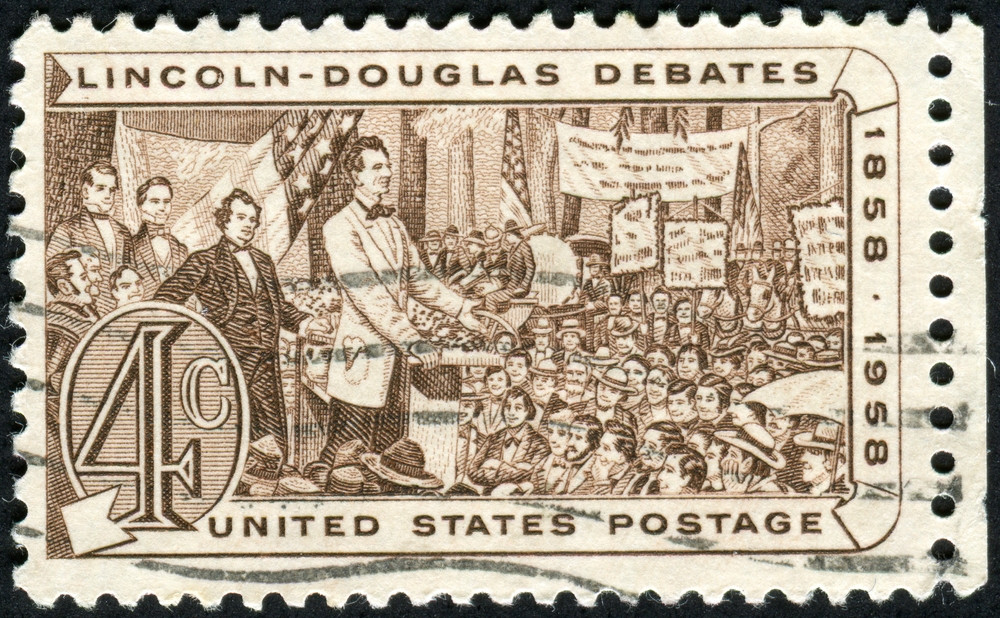The 2024 election campaign has been unprecedented in numerous ways, but one of the less expected ways has been the number of presidential debates between the two candidates. Only one debate has occurred, and for the first time in presidential history, the vice-presidential debate looks to be the last one that will be held before the November election.
So the voting public has had only one opportunity to compare the presidential candidates in an unscripted setting, responding to the issues in this election. Accordingly, it is worthwhile to ask how all this has turned out to be the case. Has the polarized political climate doomed the U.S. to being a nation no longer capable of having exchanges between candidates? If Americans refuse to accept that conclusion, what kinds of exchanges will we promote and under what specific formats and conditions?
I should add one more question: Amid all the rhetoric about “election integrity,” are presidential debates one of the fundamentals thereof—or fossils of the American past?
At this time in any other presidential election season since 1960, debates would have been occurring during the final weeks of the campaign—and indeed, in the case of several election campaign years, even practically on the eve of Election Day. For example, in no less than seven separate presidential seasons—more than half the election seasons in the last half-century that debates have been institutionalized as a feature of campaigns—not just one but three debates occurred in October. In all those seasons, a final debate occurred in the third or even fourth week. In the 1980 presidential election, for example, a third presidential debate in October occurred as late as the 28th, just seven days before the election, and it proved pivotal. Republican challenger Ronald Reagan’s closing question to voters—“Are you better off than you were four years ago?”—struck a chord and effectively framed the election in terms of economic dissatisfaction under Democratic president Jimmy Carter. The debate brought Reagan from behind, and he won the election.
Of course, until 2020, early voting in person or by mail was a relatively minor factor in the election outcome. Some commentators reasoned that, because early voting would have begun almost everywhere in 2024 by October 23, it would be pointless to hold a debate so late.
The first half of that contention is completely true. No less than 42 states will have commenced early voting by October 23, including every single swing state, which, of course, reduces the significance of a debate.
But it does not eliminate it entirely. By no means is a late-October debate “pointless”; as we have seen, it proved decisive in 1984—and might again have done so 40 years later for either candidate, changing the minds of those who had yet to cast a vote.
Nonetheless, the matter of whether America wants presidential and vice-presidential debates in the future, and if so under what conditions, is an important national issue that civic-minded Americans should ponder—especially now, when the 2024 faceoffs between the candidates are fresh in memory. Looking to the future, what kind of encounters between the candidates, and under what conditions, does the voting public want and need? What sort of exchanges will help voters assess the worthiness of the candidates for the highest office in the land? Should public pressure be exerted on the campaigns to agree to debates—as well as particular formats governing them?
Amid all the campaign noise throughout September about the potential or pointlessness of a follow-up debate between the candidates, nobody ever asked one relevant question—though anyone would be justified in doing so. Was the September 10 faceoff in Philadelphia between former President Donald Trump and Vice President Kamala Harris—or, for that matter, the exchange between Trump and President Joe Biden in June—a “debate” at all? What about the encounter between Senator J.D. Vance (R.–Ohio) and Governor Tim Walz of Minnesota on October 1?
Or were they all simply—and unfortunately—a now-rare opportunity for the public to see the candidates speak in an “unscripted” setting? Furthermore: Is an unscripted hour of answering a handful of questions even a “debate”?
Frankly, no. And certainly not for anyone who has ever participated in competitive scholastic or collegiate debate.
As an undergraduate, I toured the U.K. for three months in the late 1970s debating at three dozen universities as a member of the U.S. team jointly sponsored by the National Communication Association (USA) and the London-based English-Speaking Union of the British Commonwealth. I did a similar tour in the 1980s as a Ph.D. student. Later, for more than a decade, I served as the faculty associate in the nationally ranked summer “prep” clinic for high school debaters sponsored by the University of Texas at Austin, where I have taught. My role was to give undergraduate-level lectures providing an overview of the upcoming year’s debate topic for the 400 to 600 debaters who would attend our intensive program. Like me, all the coaches were former competitive debaters themselves and erstwhile directors of high school extracurricular debating programs. The topics alternated between foreign and domestic policy, and some of them remain controversial issues in the present day, even though the specifics have changes. For example: “Resolved: That the United States federal government should establish a foreign policy significantly limiting the use of weapons of mass destruction” (2001). Or: “Resolved: The United States federal government should substantially increase alternative energy incentives in the United States” (2008).
Biological warfare and drones, anyone? How about fracking?
Of course, none of this is to suggest that presidential candidates should behave like competitors at a collegiate or high school debate tournament. Some observers claim that Trump is congenitally incapable of sustaining a serious argument under any conditions, and that no format will channel his energies in that direction. Others maintain that Harris is unable to discuss any public issue apart from her habit of rhapsodizing in platitudes (“fostering the great aspirations of people,” “assuring opportunities for everyone”) and reducing everything to her own personal history. Still, some attempt to raise the bar—which has undeniably fallen precipitously since the four Kennedy-Nixon debates of 1960, or even between the Obama years and today—is fully warranted.
(For what it’s worth, the only match-ups worthy of the name “debates” were those between Abraham Lincoln and Stephen A. Douglas, a series of seven three-hour [!] outdoor [!!] debates in the 1858 Illinois senatorial campaign addressing the topic of slavery. Each debate opened with a one-hour extemporaneous address followed by a 90-minute reply and half-hour rebuttal—with no moderators or panelists, just the debaters themselves and a series of rapt, often passionately engaged, audiences.)
Even the formats of the debates of 2024 serve neither the public nor the candidates well. Fact-checking on the spot by moderators should be abolished—as it apparently was for the vice-presidential debate, though one of the moderators violated the agreed-upon policy during an intervention. It is the responsibility of the candidates to dispute the (arguably false) contentions of each other, however imperfectly that responsibility is executed—and the moderators and the debate format should facilitate, not frustrate, that kind of exchange.
Nor should the moderators constantly interrupt the candidates or hold forth beyond posing their questions—thereby avoiding behavior such as that by moderator Chris Wallace in 2020, who interrupted Trump more than a dozen times and spoke for more than a quarter of the allotted debate time. Nor should hosts engage before or after the debates in statements about the candidates that could be perceived as predisposing them to bias—such as the tweets issued by CNN’s Steve Scully before one of the 2020 debates.
Until 2024, the independent Commission on Presidential Debates (CPD), a nonprofit corporation established jointly by the two major parties, had determined the formats of all 33 presidential faceoffs since 1988; in my view, though not above criticism, the CPD was comparatively nonpartisan. Its eight-member board has consisted, in roughly equal numbers, of both registered Democrats and Republicans. They selected highly respected, ostensibly nonpartisan journalists to serve as debate facilitators. That is a tradition to which we need to return—and perhaps even experiment with a no-frills format such as the final Kennedy-Nixon debate, which dispensed with moderators altogether, with the candidates addressing each other directly.
The idea for something like the CPD arose in 1985, when the bipartisan National Commission on Elections (NCE) recommended that the two major parties come to terms on the formats and venues of presidential debates. This move was to circumvent the inconsistencies of the past and the decisions by some campaigns (such as Johnson’s in 1964 and Nixon’s in 1968 and 1972) to refuse to debate at all.
I believe American political leaders should convene another bipartisan commission to come up with an organization like the CPD—or revitalize the CPD itself, which still exists—and aim to return the country to a regular program of presidential debates. Those debates should be organized and sponsored by the mutual agreement of the parties long before the nominating conventions of each party, rather than be determined by the whimsy and political tactics of each election season’s new presidential candidate.
Nevertheless, the debates of 2024 have occurred within the context of an election season that has made them unique. Until 2020, candidates met with the press virtually every day, spoke impromptu on the campaign trail regularly, held lengthy Q&A sessions after their campaign speeches or off-the-cuff remarks, and readily faced interviewers who were independent-minded or even adversarial regardless of party, unlike the case today. With few exceptions, this year’s candidates refuse to “risk” an interview with journalists not openly supportive, or even handpicked partisans.
Beyond the tactics of electoral politics and the campaign strategies of the 2024 candidates, our present situation reflects the sea change in social expectations about what our leaders should be expected to do. We need to ask ourselves: To what standards will the American citizenry hold our presidential aspirants? Are they in fact any longer accountable to us, the voting public? And more: Do we really care whether a free press exists in this nation?
Open and free exchanges of views in debates—even more than oratory, let alone scripted speeches—serve as occasions for political persuasion most likely to benefit voters, because they are both rhetorical and dialectical. They embody the classical values of both pathos and logos, furnishing an opportunity to display not only eloquence and feeling, but also force of reason, command of facts and arguments, quickness of wit, and dialectical prowess. Linked to a perception of the speaker’s ethos—credibility, sincerity, authenticity—debates at their best give voters a generous idea of the candidate who stands before them and his or her qualifications to represent them.
Such debates will give Americans at least a glimpse of the kind of person we should consider as our elected leaders—and the kind of person who should be attracted to the chance to represent and lead us. Good debate formats are precisely those that preclude, or at least minimize, the kind of fakery regularly on display at choreographed campaign events (rallies, conventions, fawning interviews).
Granted: These are ideals. But the responsible civic goal must be to task any commission responsible for shaping future debate formats to come up with rules best suited to realize those ideals. Americans owe this to themselves.

